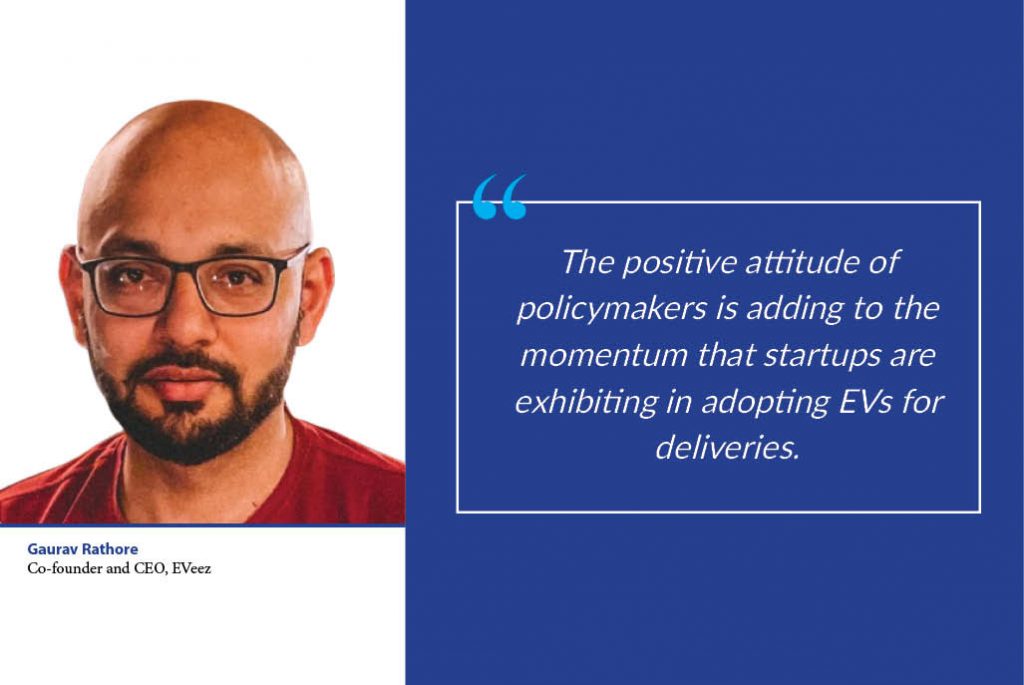Delivery startups can derive multiple benefits, including cost savings and superior sustainable credentials, from switching to Electric Mobility.
The delivery economy is growing at an exponential pace. From groceries to medicines, delivery partners are becoming part of our lifestyles. Conventional vehicles (CVs) have long been the backbone of delivery startups, but they are losing their edge. Rising fuel prices and stricter emission norms have turned the tide in favour of electric vehicles (EVs). EVs today are widely considered the future of delivery services. Delivery startups are rapidly shifting their fleets to electric mobility. The decision is environmentally friendly and makes a lot of business sense economically as well.
Cost Economics: Road to Profitable Business
Prominent among the merits of EVs for delivery startups is cost savings. Fuel accounts for a significant portion of operational expenses, and startups operate on razor-thin margins on account of higher petrol and diesel prices. EVs slash this burden dramatically. The cost/kilometre for an electric scooter is one-third of its petrol/diesel counterpart. With delivery riders covering 80-120 kilometres/day on average, the difference translates into substantial monthly savings. Moreover, EVs have fewer moving parts than CVs, meaning lower maintenance and repair costs one has to incur in their upkeep. The indispensable costs related to oil changes, engine tune-ups, and regular pollution checks are virtually eliminated in EVs. For startups, the lower operating costs enable them to operate profitably and save money for scaling their business to the next level.
Sustainable Choice: Keeping Planet Greener
The informed customers today are conscious of their environmental footprints. Many are willing to support businesses that prioritise sustainability, and startups recognise this shift in consumer sentiment. By transitioning to electric fleets, they showcase their commitment to the environment. This helps startups to build a loyal set of customers who are aligned with their business based on their green values and attitude towards sustainable consumption. The cumulative impact of emission reduction achieved owing to the use of EVs by several startups will be huge and can prove significant in combating climate change.
Policy Incentives: Added Advantage
The positive attitude of policymakers is adding to the momentum that startups are exhibiting in adopting EVs for deliveries. Both centre and state governments are pushing for EV adoption by offering attractive benefits, including free registration or exemption from road taxes. Additionally, many urban areas are restricting polluting vehicles in certain zones. This makes EVs attractive for building future-proof delivery operations which remain immune to stricter regulations that might crop up in the future.
Widespread EVs adoption among Delivery Partners: Challenges Ahead
Transition to EVs in the delivery segment is not without hurdles. Upfront purchase costs remain higher for EVs than for CVs, with the former costing up to 4X the retail price of the latter. Charging infrastructure is also not uniformly available across the country, while extra training is required for the delivery staff to safely operate EVs. That said, all these barriers are slowly and steadily diluting. With economies of scale and policy support, the total cost of ownership for EVs is on a decline. The ramping up of the charging infrastructure is in full swing and will help EVs spread their wings faster in the future. In addition, the enhanced awareness of EVs will automatically allay the prominent training requirements of today.
Conclusion
Delivery startups are at the centre of modern commerce. These shape the way millions of customers shop, eat, and live their daily lives. By shifting to EVs, startups can secure financial and strategic gains. The shift to EVs can reduce fueling and maintenance costs, besides helping delivery startups to operate sustainably. Startups that embrace EVs early will thrive and contribute meaningfully to building sustainable cities. Others who resist this change might find themselves struggling to stay competitive and even relevant.

